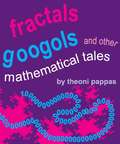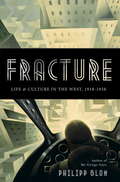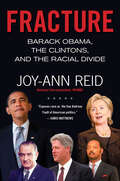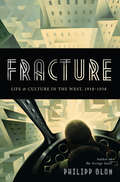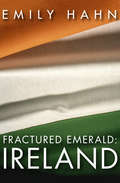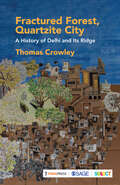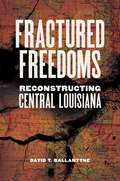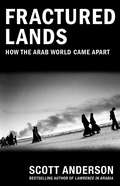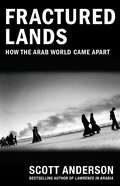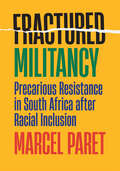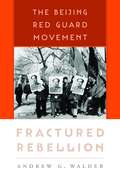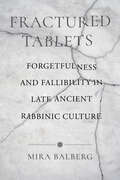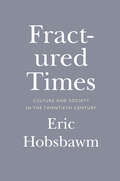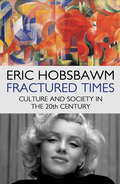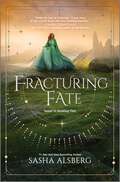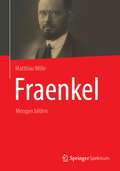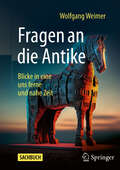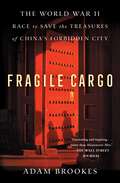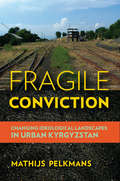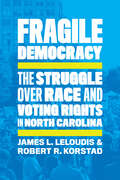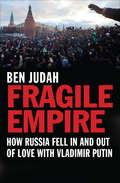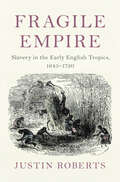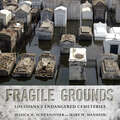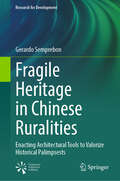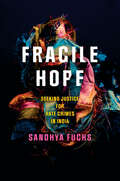- Table View
- List View
Fractals, Googols, and Other Mathematical Tales
by Theoni PappasA treasure trove of stories that make mathematical ideas come to life. Explores math concepts and topics such as real numbers, exponents, dimensions, the golden rectangle in both serious and humorous ways. Stories such as the parable of p, the number line that fell apart, Leonhard the magic turtle and many others offer an amusing and entertaining way to explore and share mathematical ideas regardless of age or background. The reference section following each story is designed as enrichment information for the concepts presented in each story.
Fracture
by Philipp BlomFrom the critically-acclaimed author of The Vertigo Years comes a major new history of the interwar period, the few decades of peace that gave birth to the political and cultural movements that would define the twentieth century.When the Great War ended in 1918, the West was broken. Religious faith, patriotism, and the belief in human progress had all been called into question by the mass carnage experienced by both sides. Shell shocked and traumatized, the West faced a world it no longer recognized: the old order had collapsed, replaced by an age of machines. The world hurtled forward on gears and crankshafts, and terrifying new ideologies arose from the wreckage of past belief. In Fracture, critically acclaimed historian Philipp Blom argues that in the aftermath of World War I, citizens of the West directed their energies inwards, launching into hedonistic, aesthetic, and intellectual adventures of self-discovery. It was a period of both bitter disillusionment and visionary progress. From Surrealism to Oswald Spengler's The Decline of the West; from Fritz Lang's Metropolis to theoretical physics, and from Art Deco to Jazz and the Charleston dance, artists, scientists, and philosophers grappled with the question of how to live and what to believe in a broken age. Morbid symptoms emerged simultaneously from the decay of World War I: progress and innovation were everywhere met with increasing racism and xenophobia. America closed its borders to European refugees and turned away from the desperate poverty caused by the Great Depression. On both sides of the Atlantic, disenchanted voters flocked to Communism and fascism, forming political parties based on violence and revenge that presaged the horror of a new World War. Vividly recreating this era of unparalleled ambition, artistry, and innovation, Blom captures the seismic shifts that defined the interwar period and continue to shape our world today.From the Hardcover edition.
Fracture: Barack Obama, the Clintons, and the Racial Divide
by Joy-Ann ReidBarack Obama's speech on the Edmund Pettus Bridge to mark the fiftieth anniversary of the Selma to Montgomery marches should have represented the culmination of Martin Luther King Jr.'s dream of racial unity. Yet, in Fracture, MSNBC national correspondent Joy-Ann Reid shows that, despite the progress we have made, we are still a nation divided—as seen recently in headline-making tragedies such as the killing of Trayvon Martin and the uprisings in Ferguson and Baltimore.With President Obama's election, Americans expected an open dialogue about race but instead discovered the irony of an African American president who seemed hamstrung when addressing racial matters, leaving many of his supporters disillusioned and his political enemies sharpening their knives. To understand why that is so, Reid examines the complicated relationship between Barack Obama and Bill and Hillary Clinton, and how their varied approaches to the race issue parallel the challenges facing the Democratic party itself: the disparate parts of its base and the whirl of shifting allegiances among its power players—and how this shapes the party and its hopes of retaining the White House.Fracture traces the party's makeup and character regarding race from the civil rights days to the Obama presidency. Filled with key political players such as Shirley Chisholm, Jesse Jackson, John Lewis, and Al Sharpton, it provides historical context while addressing questions arising as we head into the next national election: Will Hillary Clinton's campaign represent an embrace of Obama's legacy or a repudiation of it? How is Hillary Clinton's stand on race both similar to and different from Obama's, or from her husband's? How do minorities view Mrs. Clinton, and will they line up in huge numbers to support her—and what will happen if they don't?Veteran reporter Joy-Ann Reid investigates these questions and more, offering breaking news, fresh insight, and experienced insider analysis, mixed with fascinating behind-the-scenes drama, to illuminate three of the most important figures in modern political history, and how race can affect the crucial 2016 election and the future of America itself.
Fracture: Life and Culture in the West, 1918-1938
by Philipp BlomWhen the Great War ended in 1918, the West was broken. Religious faith, patriotism, and the belief in human progress had all been called into question by the mass carnage experienced by both sides. Shell shocked and traumatized, the West faced a world it no longer recognized: the old order had collapsed, replaced by an age of machines. The world hurtled forward on gears and crankshafts, and terrifying new ideologies arose from the wreckage of past belief. In Fracture, critically acclaimed historian Philipp Blom argues that in the aftermath of World War I, citizens of the West directed their energies inwards, launching into hedonistic, aesthetic, and intellectual adventures of self-discovery. It was a period of both bitter disillusionment and visionary progress. From Surrealism to Oswald Spengler’s The Decline of the West; from Fritz Lang’s Metropolis to theoretical physics, and from Art Deco to Jazz and the Charleston dance, artists, scientists, and philosophers grappled with the question of how to live and what to believe in a broken age. Morbid symptoms emerged simultaneously from the decay of World War I: progress and innovation were everywhere met with increasing racism and xenophobia. America closed its borders to European refugees and turned away from the desperate poverty caused by the Great Depression. On both sides of the Atlantic, disenchanted voters flocked to Communism and fascism, forming political parties based on violence and revenge that presaged the horror of a new World War. Vividly recreating this era of unparalleled ambition, artistry, and innovation, Blom captures the seismic shifts that defined the interwar period and continue to shape our world today.
Fractured Emerald: Ireland
by Emily HahnThe New Yorker contributor&’s fascinating account of Irish history from legendary kings to occupation, independence, and modern political strife. The author of The Soong Sisters and China to Me turns her observant and discerning eye to the oft‑troubled land of Ireland. In a magisterial combination of historical research and keen personal observation on the scene, Emily Hahn gives us a view of the whole of Ireland and its history, from the legends of the great kings and the heroes of myth to the Saint who converted Ireland to Christianity many centuries ago to modern times. She details the trials and tribulations of a conquered people as they rebel against their exploiters and fight and die for independence, eventually achieving their goal but only at the price of a bitter partition that haunts the country to this day. Hahn&’s breadth of vision and acute sense of the telling detail paints the big picture while also pinpointing the small but important moments. Perhaps the subtitle manages to encapsulate it all: Ireland, Its Legends, Its History, Its People from St. Patrick to Bernadette Devlin.
Fractured Forest, Quartzite City: A History of Delhi and its Ridge
by Thomas CrowleyA sprawling megacity of nearly twenty million people, Delhi has forgotten its ecological history, a key part of which is the Ridge, often referred to as Delhi′s ‘green lung’. At various points, Delhi has been a crucial hub of politics, warfare, trade and religious expansion on regional and global levels. Placing Delhi’s environment at the front and centre of its unique history, the book tells the tale of the Ridge, which resonates far beyond the boundaries of India′s capital. The Ridge offers a crucial vantage point for viewing these historical and geographical interconnections. Its trees can′t be separated from the stones below them, nor the cities that rose and fell around them. Only with this perspective does a clear picture of the Ridge—and Delhi as a whole—emerge.
Fractured Freedoms: Reconstructing Central Louisiana (Conflicting Worlds: New Dimensions of the American Civil War)
by Dr. David T. BallantyneDavid T. Ballantyne’s Fractured Freedoms is a riveting history of central Louisiana from the 1860s to the 1890s, focusing on majority-Black Rapides Parish during Reconstruction. Using the region as a case study, Ballantyne reveals what is, in part, a rural Reconstruction success story, emphasizing the resilience of Black politics and the persistence of significant divisions among white residents that allowed the Republican Party to gain and maintain power there. It was only with the collapse of state-level Republican power in 1877 that Democratic forces in the parish were able to dismantle local Republican political control and gradually constrict Black freedoms.
Fractured Lands: How the Arab World Came Apart
by Scott AndersonThe catastrophic story of how the Arab world has descended into chaos since the 2003 invasion of Iraq as told by the National Book Critics Circle Award finalist and international bestselling author of Lawrence in Arabia, a probing and insightful work of reportage.From world-renowned war correspondent, Scott Anderson, comes this gripping, human account of the unraveling of the Arab world, the rise of ISIS, and the global refugee crisis after the United States invasion of Iraq in 2003. Thisportrait of the region is framed by the stories of six individuals--the matriarch of a dissident Egyptian family, a Libyan Air Force cadet with divided loyalties, an Iraqi day-laborer turned ISIS fighter, a Kurdish doctor on leave from his practice to fight ISIS, a college student caught in the chaos of Aleppo, and an Iraqi women's rightsactivist targeted by militias. Through these personal stories, the myriad, complex causes of the widespread war and instability in the region come into focus and the concrete reality of the unspeakable tragedies occurring in the Middle East becomes clear.
Fractured Lands: How the Arab World Came Apart
by Scott AndersonFrom the bestselling author of Lawrence in Arabia, a piercing account of how the contemporary Arab world came to be riven by catastrophe since the 2003 United States invasion of Iraq.In 2011, a series of anti-government uprisings shook the Middle East and North Africa in what would become known as the Arab Spring. Few could predict that these convulsions, initially hailed in the West as a triumph of democracy, would give way to brutal civil war, the terrors of the Islamic State, and a global refugee crisis. But, as New York Times bestselling author Scott Anderson shows, the seeds of catastrophe had been sown long before. In this gripping account, Anderson examines the myriad complex causes of the region’s profound unraveling, tracing the ideological conflicts of the present to their origins in the United States invasion of Iraq in 2003 and beyond. From this investigation emerges a rare view into a land in upheaval through the eyes of six individuals—the matriarch of a dissident Egyptian family; a Libyan Air Force cadet with divided loyalties; a Kurdish physician from a prominent warrior clan; a Syrian university student caught in civil war; an Iraqi activist for women’s rights; and an Iraqi day laborer-turned-ISIS fighter. A probing and insightful work of reportage, Fractured Lands offers a penetrating portrait of the contemporary Arab world and brings the stunning realities of an unprecedented geopolitical tragedy into crystalline focus.
Fractured Militancy: Precarious Resistance in South Africa after Racial Inclusion
by Marcel ParetDrawing on extensive ethnographic fieldwork and interviews with activists, Fractured Militancy tells the story of postapartheid South Africa from the perspective of Johannesburg's impoverished urban Black neighborhoods. Nearly three decades after South Africa's transition from apartheid to democracy, widespread protests and xenophobic attacks suggest that not all is well in the once-celebrated "rainbow nation." Marcel Paret traces rising protests back to the process of democratization and racial inclusion. This process dangled the possibility of change but preserved racial inequality and economic insecurity, prompting residents to use militant protests to express their deep sense of betrayal and to demand recognition and community development. Underscoring remarkable parallels to movements such as Black Lives Matter in the United States, this account attests to an ongoing struggle for Black liberation in the wake of formal racial inclusion.Rather than unified resistance, however, class struggles within the process of racial inclusion produced a fractured militancy. Revealing the complicated truth behind the celebrated "success" of South African democratization, Paret uncovers a society divided by wealth, urban geography, nationality, employment, and political views. Fractured Militancy warns of the threat that capitalism and elite class struggles present to social movements and racial justice everywhere.
Fractured Rebellion: The Beijing Red Guard Movement
by Andrew G. WalderFractured Rebellion is the first full-length account of the evolution of China’s Red Guard Movement in Beijing, the nation’s capital, from its beginnings in 1966 to its forcible suppression in 1968. Andrew Walder combines historical narrative with sociological analysis as he explores the radical student movement’s crippling factionalism, devastating social impact, and ultimate failure. Most accounts of the movement have portrayed a struggle among Red Guards as a social conflict that pitted privileged “conservative” students against socially marginalized “radicals” who sought to change an oppressive social and political system. Walder employs newly available documentary evidence and the recent memoirs of former Red Guard leaders and members to demonstrate that on both sides of the bitter conflict were students from comparable socioeconomic backgrounds, who shared similar—largely defensive—motivations. The intensity of the conflict and the depth of the divisions were an expression of authoritarian political structures that continued to exert an irresistible pull on student motives and actions, even in the midst of their rebellion. Walder’s nuanced account challenges the main themes of an entire generation of scholarship about the social conflicts of China’s Cultural Revolution, shedding light on the most tragic and poorly understood period of recent Chinese history.
Fractured Tablets: Forgetfulness and Fallibility in Late Ancient Rabbinic Culture
by Mira BalbergA free ebook version of this title is available through Luminos, University of California Press’s Open Access publishing program. Visit www.luminosoa.org to learn more. This book examines the significant role that memory failures play in early rabbinic literature. The rabbis who shaped Judaism in late antiquity envisioned the commitment to the Torah and its commandments as governing every aspect of a person’s life. Their vision of a Jewish subject who must keep constant mental track of multiple obligations and teachings led them to be preoccupied with forgetting: forgetting tasks, forgetting facts, forgetting texts, and—most broadly—forgetting the Torah altogether. In Fractured Tablets, Mira Balberg examines the ways in which the early rabbis approached and delineated the possibility of forgetfulness in practice and study and the solutions and responses they conjured for forgetfulness, along with the ways in which they used human fallibility to bolster their vision of Jewish observance and their own roles as religious experts. In the process, Balberg shows that the rabbis’ intense preoccupation with the prospect of forgetfulness was a meaningful ideological choice, with profound implications for our understanding of Judaism in late antiquity.
Fractured Times
by Eric HobsbawmEric Hobsbawm, who passed away in 2012, was one of the most brilliant and original historians of our age. Through his work, he observed the great twentieth-century confrontation between bourgeois fin de siècle culture and myriad new movements and ideologies, from communism and extreme nationalism to Dadaism to the emergence of information technology. In Fractured Times, Hobsbawm, with characteristic verve, unpacks a century of cultural fragmentation.Hobsbawm examines the conditions that both created the flowering of the belle époque and held the seeds of its disintegration: paternalistic capitalism, globalization, and the arrival of a mass consumer society. Passionate but never sentimental, he ranges freely across subjects as diverse as classical music, the fine arts, rock music, and sculpture. He records the passing of the golden age of the "free intellectual" and explores the lives of forgotten greats; analyzes the relationship between art and totalitarianism; and dissects phenomena as diverse as surrealism, art nouveau, the emancipation of women, and the myth of the American cowboy.Written with consummate imagination and skill, Fractured Times is the last book from one of our greatest modern-day thinkers.
Fractured Times: Culture and Society in the Twentieth Century
by Eric HobsbawmBorn almost a hundred years ago in Vienna - the cultural heart of a bourgeois Mitteleurope - Eric Hobsbawm, who was to become one of the most brilliant and original historians of our age, was uniquely placed to observe an era of titanic social and artistic change. As the century progressed, the forces of Communism and Dadaism, Ibiza and cyberspace, would do battle with the bourgeois high culture fin-de-siècle Vienna represented - the opera, the Burgtheater, the museums of art and science, City Hall. In Fractured Times Hobsbawm unpicks a century of cultural fragmentation and dissolution with characteristic verve and vigour.Hobsbawm examines the conditions that created the great cultural flowering of the belle époque and held the seeds of its disintegration, from paternalistic capitalism to globalisation and the arrival of a mass consumer society. Passionate but never sentimental, Hobsbawm ranges freely across his subject: he records the passing of the golden age of the 'free intellectual' and examines the lives of great, forgotten men; he analyses the relation between art and totalitarianism and dissects cultural phenomena as diverse as surrealism, women's emancipation and the American cowboy myth. Written with consummate imagination and skill, Fractured Times is the last book from one of our greatest modern-day thinkers.
Fracturing Fate
by Sasha AlsbergDon&’t miss the stunning conclusion to the Breaking Time duology! "Perfect for fans of Outlander... A lush story of star crossed lovers and time traveling assassins." —Laura Sebastian, New York Times bestselling author of Ash PrincessHistory tore them apart. Can they survive their future? While consumed in a devastating battle with the demigod Llaw, Klara is mysteriously catapulted five hundred years into the past, suddenly alone and distraught that she and her fated love Callum killed the demigod at the expense of Callum&’s own life. As the last Pillar of Time, an anchor point in the timeline of the world, Klara must navigate dangerous magic, confusing visions, and powerful adversaries to determine the fate of the world and avenge the life of her love. But with all the treacherous enemies—magical and human alike—chasing Klara in 1500s Scotland, she has no idea what, and whom, she actually left behind on the battlefield in 2022. In a battle across history and the present, life and death, Klara must fight to choose her own fate.
Fraenkel: Mengen bilden
by Matthias WilleErleben Sie das Wiedererwachen des universitären Lebens nach 1918 aus der Sicht eines Betroffenen. Tauchen Sie ein in die Erziehungs- und Sozialgeschichte der Mathematik zur Zeit der Weimarer Republik und erfahren aus der Perspektive eines jungen Autors das Aufstreben der Firma von Julius Springer zum führenden Mathematikverlag. Dank der Verwendung einer Vielzahl von unveröffentlichten Quellen erhalten Sie einen überaus facettenreichen Eindruck des zeitgenössischen akademischen Milieus. In dieser weltweit ersten umfassenden Studie zu Abraham Adolf Fraenkel werden Ihnen bis dato vollkommen unbekannte Einblicke in die Werkstatt seiner mathematischen Gedanken geboten, die verständlich machen, wie innerhalb kürzester Zeit aus einem Laien ein international renommierter Experte für Mengenlehre wurde. Minutiös wird rekonstruiert, wie er vor exakt 100 Jahren zu seinen wegweisenden Resultaten gelangte, die schließlich zum unaufhaltsamen Aufstieg des modernen mengentheoretischen Paradigmas führten.
Fragen an die Antike: Blicke in eine uns ferne und nahe Zeit
by Wolfgang WeimerDie Antike ist die Vorläuferin und die Grundlage des heutigen Europa und der Kultur, die von Europa ausging. Insoweit ist sie uns nah. In der Allgemeinbildung ist sie allerdings fast nur noch in Form von einzelnen Aussprüchen, Legenden und Mythen präsent, wie etwa: Der Würfel ist gefallen, die 300 Spartaner an den Thermopylen, der Krösus oder das Trojanische Pferd. Das ist meist eher kurios als bedeutend. Insoweit ist sie uns fern. Das Buch geht in 55 Kapiteln solchen Ansätzen nach und untersucht, ob diese Bruchstücke eine Grundlage in den antiken Texten haben, in welchem Zusammenhang sie stehen und ob man bestimmte Vorurteile ändern sollte. Auf diese Weise entsteht ein genaueres Bild der Antike aus den Quellen, das sie uns näherrücken lässt und gleichzeitig ihre Andersheit bewusst macht, nun aber so, dass uns dadurch unsere Eigenheiten klarer werden. Es gibt viel Verbindendes und viel Trennendes, und beides verschafft uns ein besseres Bewusstsein dessen, was uns ausmacht.
Fragile Cargo: The World War II Race to Save the Treasures of China's Forbidden City
by Adam BrookesThe gripping true story of the bold and determined museum curators who saved the priceless treasures of China&’s Forbidden City in the years leading up to World War II and beyond.Spring 1933: The silent courtyards and palaces of Peking&’s Forbidden City, for centuries the home of Chinese emperors, are tense with fear and expectation. Japan&’s aircrafts drone overhead, its troops and tanks are only hours away. All-out war between China and Japan is coming, and the curators of the Forbidden City are faced with an impossible question: how will they protect the vast imperial art collections in their charge? A difficult and monumental decision is made: to safeguard the treasures, they will need to be evacuated. The magnificent collections contain a million pieces of art—objects that carry China&’s deepest and most ancient memories. Among them are irreplaceable artefacts: exquisite paintings on silk, vanishingly rare Ming porcelain, and the extraordinary Stone Drums of Qin, which are adorned with 2,500-year-old inscriptions of crucial cultural significance. For sixteen terrifying years, under the quiet leadership of museum director Ma Heng, the curators would go on to transport the imperial art collections thousands of miles across China—up rivers of white water, across mountain ranges, and through burning cities. In their search for safety the curators and their fragile, invaluable cargo journeyed through the maelstrom of violence, chaos, and starvation that was China&’s Second World War. Told for the first time in English and playing out across a vast historical canvas, this is the exhilarating story of a small group of men and women who, when faced with war&’s onslaught on civilization, chose to resist. Fragile Cargo reminds us of the enduring power of beauty in a world beset by conflict and violence.
Fragile Conviction: Changing Ideological Landscapes in Urban Kyrgyzstan
by Mathijs PelkmansHow do specific secular and religious ideologies—such as nationalism, neoliberalism, atheism, Pentecostalism, Tablighi Islam, and shamanism—gain popularity and when do they lose traction? To answer these questions, Mathijs Pelkmans critically examines the trajectories of a range of ideologies as they move into the post-Soviet frontier in Central Asia. Ethnographically rooted in the everyday life of a former mining town in southern Kyrgyzstan, Fragile Conviction shows how residents have dealt with the existential and epistemic crises that arose after the collapse of the Soviet Empire. Residents became enchanted by the truths of Muslim and Christian missionaries, embraced the teachings of neoliberal and nationalist ideologues, and were riveted by the visions of shamanic healers. But no matter how much enthusiasm and hope these ideas first engendered, the commitment to any of them rarely lasted very long.Pelkmans finds that there is an inverse relationship between the tenacity and the effervescence of collective ideas, between their strength to persist and their ability to trigger committed action. Introducing the concept of pulsation, he argues in Fragile Conviction that ideational power must be understood in relation to three aspects: the voicing of the idea, its tension with everyday reality, and its reverberation within groups of listeners. The conclusion that the power of conviction is rooted in the instability of sociocultural contexts is a message that has relevance far beyond urban Central Asia.
Fragile Democracy: The Struggle over Race and Voting Rights in North Carolina
by Robert R. Korstad James L. LeloudisAmerica is at war with itself over the right to vote, or, more precisely, over the question of who gets to exercise that right and under what circumstances. Conservatives speak in ominous tones of voter fraud so widespread that it threatens public trust in elected government. Progressives counter that fraud is rare and that calls for reforms such as voter ID are part of a campaign to shrink the electorate and exclude some citizens from the political life of the nation.North Carolina is a battleground for this debate, and its history can help us understand why--a century and a half after ratification of the Fifteenth Amendment--we remain a nation divided over the right to vote. In Fragile Democracy, James L. Leloudis and Robert R. Korstad tell the story of race and voting rights, from the end of the Civil War until the present day. They show that battles over the franchise have played out through cycles of emancipatory politics and conservative retrenchment. When race has been used as an instrument of exclusion from political life, the result has been a society in which vast numbers of Americans are denied the elements of meaningful freedom: a good job, a good education, good health, and a good home. That history points to the need for a bold new vision of what democracy looks like.
Fragile Empire: How Russia Fell In and Out of Love with Vladimir Putin
by Ben Judah&“A beautifully written and very lively study of Russia that argues that the political order created by Vladimir Putin is stagnating&” (Financial Times). From Kaliningrad on the Baltic to the Russian Far East, journalist Ben Judah has traveled throughout Russia and the former Soviet republics, conducting extensive interviews with President Vladimir Putin&’s friends, foes, and colleagues, government officials, business tycoons, mobsters, and ordinary Russian citizens. Fragile Empire is the fruit of Judah&’s thorough research: A probing assessment of Putin&’s rise to power and what it has meant for Russia and her people. Despite a propaganda program intent on maintaining the cliché of stability, Putin&’s regime was suddenly confronted in December 2011 by a highly public protest movement that told a different side of the story. Judah argues that Putinism has brought economic growth to Russia but also weaker institutions, and this contradiction leads to instability. The author explores both Putin&’s successes and his failed promises, taking into account the impact of a new middle class and a new generation, the Internet, social activism, and globalization on the president&’s impending leadership crisis. Can Russia avoid the crisis of Putinism? Judah offers original and up-to-the-minute answers. &“[A] dynamic account of the rise (and fall-in-progress) of Russian President Vladimir Putin.&” —Publishers Weekly &“[Judah] shuttles to and fro across Russia&’s vast terrain, finding criminals, liars, fascists and crooked politicians, as well as the occasional saintly figure.&” —The Economist &“His lively account of his remote adventures forms the most enjoyable part of Fragile Empire, and puts me in mind of Chekhov&’s famous 1890 journey to Sakhalin Island.&” —The Guardian
Fragile Empire: Slavery in the Early English Tropics, 1645–1720 (Slaveries since Emancipation)
by Justin RobertsFragile Empire reinterprets the rise of slavery in the early English tropics through an innovative geographic framework. It examines slavery at English sites in tropical zones across the Atlantic and Indian oceans, and argues that a variety of factors – epidemiology, slave majorities, European rivalries, and the power of indigenous polities – made the seventeenth-century English tropical empire particularly fragile, creating a model of empire in the tropics that was distinct from other English colonizations. English people across the tropics were outnumbered by their slaves. English slavery was forged in the tropics and it was increasingly marked by its permanence, inflexibility, and brutality. Early English societies were not the inevitable precursor to British imperial dominance, instead they were wrought with internal vulnerabilities and external threats from European and non-European competitors. Based on thorough archival research, Justin Roberts' important new study redefines our understanding of slavery and bound labor from a global perspective.
Fragile Grounds: Louisiana's Endangered Cemeteries (America's Third Coast Series)
by Mary H. Manhein Jessica H. SchexnayderRecipient of a 2018 Preserve Louisiana Award and a 2018 Coastal Stewardship AwardFragile Grounds compiles stories and photographs of endangered cemeteries throughout Louisiana's coastal zone and beyond. These burial places link the fragile land to the frailty of the state's threatened community structures. The book highlights the state's vibrant diversity by showing its unique burial customs and traditions, while it also identifies the urgent need for ongoing documentation of cultural elements at risk.Cemeteries associated with the culturally rich communities of Louisiana reflect the history and global settlement patterns of the state. Yet many are endangered due to recurring natural and man-made events. Nearly 80 percent of the nation's coastal land loss occurs in Louisiana. Coastal erosion, sinking land, flooding, storm surge, and sea-level rise have led to an inland migration that threatens to unravel the fabric of Louisiana and, by association, hastens the demise of its burial places.As people are forced inland, migrants abandon, neglect, or often overlook cemeteries as part of the cultural landscape. In terms of erosion, when the land goes, the cemetery goes with it. Cemeteries fall prey to inland and coastal flooding. As cities grow outward, urban sprawl takes over the landscape. Cemeteries lose out to forces such as expansion, eminent domain, and urban neglect. Not only do cemeteries give comfort for the living, but they also serve as a vital link to the past. Once lost, that past cannot be recovered.
Fragile Heritage in Chinese Ruralities: Enacting Architectural Tools to Valorize Historical Palimpsests (Research for Development)
by Gerardo SemprebonThis book explores the concept of fragile heritage as an architectural legacy and a territorial resource in rural China, emphasizing the significance in safeguarding its unique cultural trajectory, and laying the groundwork for future developments. Chinese rural buildings and settlements encapsulate priceless cultural values, but become increasingly vulnerable, under increasing pressures. Socioeconomic transitions, climate change, political agendas, land rent speculation, awakenings, and commodifications of cultural values, redefine the conceptual and operational framework of countryside transformation, and contribute to the debate on contemporary architectural and urban design. In this context, rural authenticity emerges as a crucial value in architectural morpho-typology, construction techniques, and expressive codes. The book introduces the notion of fragile heritage as the crossroad between folklore, academia, and practice. Next, it put in place reading methods to frame rural settlements as cultural palimpsests, indissolubly tying architectures to the landscape. These concepts are then applied to a multiscalar analysis of fifteen traditional architectures to uncover rural space and society's physical and cultural dimensions. Finally, it discusses recent revitalization projects, highlighting the potential role of architectural design. The research methodology relies on fieldwork campaigns in the Fujian and Zhejiang Provinces of China between 2017 and 2019 and a subsequent critical ri-elaboration that leverages the graphic apparatus as the fundamental investigative tool. The central idea put forward in this book is that, between tradition and innovation, the fragile heritage of past societies needs a cultural translation, interpretation, and negotiation to find space and life in the contemporary milieu.
Fragile Hope: Seeking Justice for Hate Crimes in India (South Asia in Motion)
by Sandhya FuchsAgainst the backdrop of the global Black Lives Matter movement, debates around the social impact of hate crime legislation have come to the political fore. In 2019, the UN Commission on Crime Prevention and Criminal Justice urgently asked how legal systems can counter bias and discrimination. In India, a nation with vast socio-cultural diversity, and a complex colonial past, questions about the relationship between law and histories of oppression have become particularly pressing. Recently, India has seen a rise in violence against Dalits (ex-untouchables) and other minorities. Consequently, an emerging "Dalit Lives Matter" movement has campaigned for the effective implementation of India's only hate crime law: the 1989 Scheduled Castes/Scheduled Tribes Prevention of Atrocities Act (PoA). Drawing on long-term fieldwork with Dalit survivors of caste atrocities, human rights NGOs, police, and judiciary, Sandhya Fuchs unveils how Dalit communities in the state of Rajasthan interpret and mobilize the PoA. Fuchs shows that the PoA has emerged as a project of legal meliorism: the idea that persistent and creative legal labor can gradually improve the oppressive conditions that characterize Dalit lives. Moving beyond statistics and judicial arguments, Fuchs uses the intimate lens of personal narratives to lay bare how legal processes converge and conflict with political and gendered concerns about justice for caste atrocities, creating new controversies, inequalities, and hopes.
